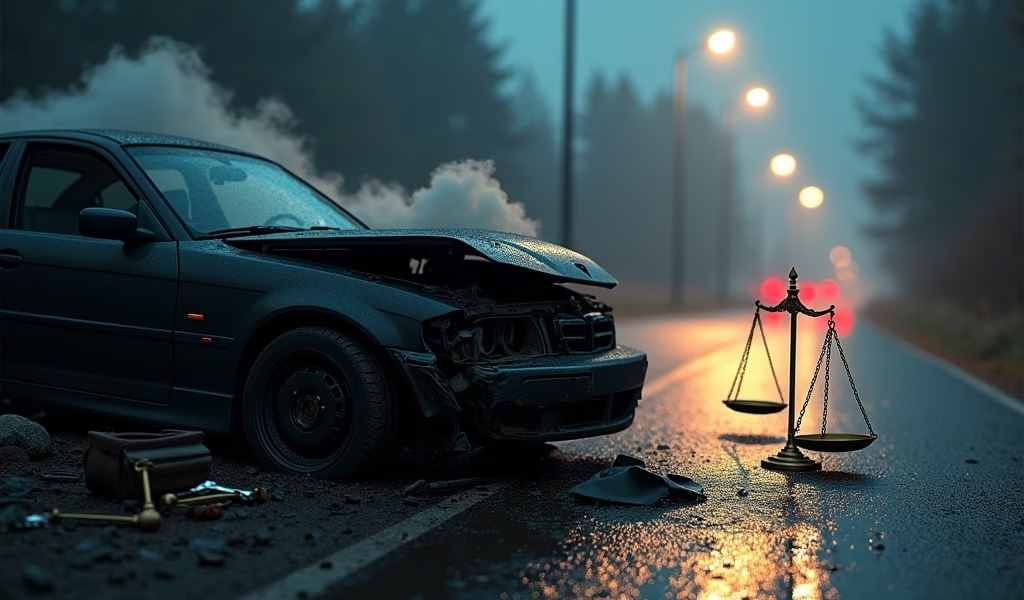Overview
This article provides five essential strategies that lawyers use when they become accident victims: documenting everything with photos and witness information, being careful with verbal statements that could imply fault, seeking immediate medical attention even for minor symptoms, avoiding rushed settlement offers, and securing digital evidence that might support your claim. These approaches help protect your rights and maximize potential compensation after an accident, while preventing costly mistakes that insurance companies might exploit.
Table of Contents
- When Lawyers Become Accident Victims: Understanding the Road Ahead
- 1. Document Everything: Your Phone Is Your Legal Shield
- 2. Mind Your Words: The High Cost of “I’m Sorry”
- 3. Seek Medical Help Immediately: Your Body’s Hidden Warning System
- 4. Don’t Rush to Settle: Why Patience Pays Off
- 5. Secure Digital Evidence: The Electronic Trail Matters
- Protecting Your Rights After an Accident
- Frequently Asked Questions
When Lawyers Become Accident Victims: Understanding the Road Ahead
Even the most seasoned legal professionals can find themselves on the receiving end of a car accident. Like ships passing in the night, vehicles sometimes collide when least expected, leaving even lawyers to navigate the choppy waters of insurance claims and potential legal battles.
Having worked with countless attorneys who’ve experienced accidents firsthand, I’ve gathered their hard-earned wisdom from both professional expertise and personal experience. These insights aren’t taught in driving school or found in your vehicle’s manual, but they could save you thousands in potential compensation and prevent costly mistakes.
As someone who’s spent decades under the hood and helping drivers through post-accident repairs, I’ve witnessed how a proper insurance claim can mean the difference between a smooth repair process and financial disaster. When a lawyer experiences a car accident, they immediately implement these five critical strategies – and now you can too.
1. Document Everything: Your Phone Is Your Legal Shield
The moment metal meets metal and the dust settles, your smartphone becomes your most powerful ally. Think of it as your instant evidence collector, preserving what would otherwise fade faster than brake dust on a wheel.
Attorneys don’t leave documentation to chance, and neither should you. Take comprehensive photos that tell the complete story:
- Vehicle damage from multiple angles (close-up and distance shots)
- The entire accident scene, including road conditions and traffic signals
- Position of vehicles in relation to each other
- Skid marks or debris patterns on the road
- Weather and visibility conditions
- License plates and driver information (with permission)
Beyond photos, collect witness contact information before they disappear into the wind. Their observations could be the missing puzzle piece that validates your version of events. Note the exact time, date, and GPS location – details that seem obvious in the moment but become foggy as days pass.
I’ve seen too many drivers come to my shop with extensive damage and insufficient documentation, leaving them at the mercy of insurance adjusters who weren’t there to witness the crash. Don’t make this costly mistake – document thoroughly and immediately.

2. Mind Your Words: The High Cost of “I’m Sorry”
Ever noticed how attorneys carefully measure their words? There’s good reason for this verbal caution. At accident scenes, emotions run hotter than an overworked engine, and our natural tendency to apologize – even when we’ve done nothing wrong – can backfire spectacularly.
Those two little words, “I’m sorry,” can transform into a full admission of fault in the eyes of insurance companies. I’ve seen drivers sink their own cases before the tow truck even arrives.
Instead, limit your conversation to these essentials:
- Exchange name, contact, and insurance information
- Check on the other person’s wellbeing without discussing fault
- Speak factually about what happened without speculation
- Answer police questions honestly but concisely
When speaking with law enforcement, provide straightforward information without volunteering additional details. Remember that the police report becomes a critical document in determining fault, and your statements will be recorded there in black and white.
Think of your words at an accident scene like premium fuel – use only what’s necessary and make sure it’s the right type. One wrong comment can contaminate your entire claim and cost you thousands in potential settlement money.
3. Seek Medical Help Immediately: Your Body’s Hidden Warning System
Just as engines can develop hidden damage from a collision, your body’s warning system isn’t always immediately obvious. That’s why lawyers always seek medical attention after an accident – even when they feel “perfectly fine.”
The human body releases adrenaline during accidents, temporarily masking pain and injury. What feels like minor stiffness today can evolve into debilitating pain days or weeks later. By then, insurance companies will question the connection between your injuries and the accident.
To protect both your health and potential claim:
- Get a medical examination within 24 hours of the accident
- Report ALL symptoms, no matter how minor they seem
- Follow treatment protocols exactly as prescribed
- Attend every follow-up appointment without exception
- Keep detailed records of medical expenses and recovery progress
As someone who’s diagnosed thousands of vehicle problems, I can tell you that early detection prevents catastrophic failures. The same principle applies to your body. That “small twinge” could indicate serious underlying damage, just like that “little noise” under your hood might signal major engine trouble.
According to the Mayo Clinic’s research on whiplash injuries, symptoms commonly develop 24 hours after an accident but can sometimes take days or weeks to appear. Without proper medical documentation from day one, you might find yourself fighting an uphill battle for rightful compensation.
4. Don’t Rush to Settle: Why Patience Pays Off
When an insurance adjuster calls with a settlement offer, they’re not doing you a favor – they’re doing their job. And their job includes closing your claim as quickly and inexpensively as possible.
Attorneys understand that initial settlement offers are like used car opening prices – merely a starting point for negotiation, not the true value. Insurance companies bank on your desire for quick resolution and immediate cash, hoping you’ll accept far less than your claim is worth.
Before considering any settlement:
- Understand the full extent of your injuries and recovery timeline
- Calculate ALL expenses (vehicle repairs, medical bills, lost wages, rental costs)
- Consider future expenses that may arise from the accident
- Factor in non-economic damages like pain and suffering
- Consult with a professional about fair compensation for your situation
I’ve seen too many drivers accept quick settlements only to discover their insurance coverage limitations when additional repairs or medical treatments became necessary. The difference between an initial offer and fair compensation can be as dramatic as the difference between a base model and fully-loaded vehicle – thousands of dollars in value.
Remember that time is typically on your side in negotiations. While waiting might feel like watching paint dry, the financial difference can significantly impact your recovery journey. Don’t let temporary financial pressure force you into a permanent settlement you’ll regret.

5. Secure Digital Evidence: The Electronic Trail Matters
In our connected world, digital breadcrumbs often exist that can substantiate your version of events. Smart lawyers immediately look beyond the physical accident scene to electronic evidence that might silently support your claim.
Consider these often-overlooked sources of supporting evidence:
- Traffic camera footage from nearby intersections
- Business security recordings that might have captured the accident
- Dashcam videos from your vehicle or others nearby
- GPS data showing your speed and location
- Rideshare records if relevant to your journey
- Cell phone data that might prove distracted driving by the other party
Act quickly – surveillance footage is typically deleted after 24-48 hours. A prompt request to preserve this evidence can transform a “he-said-she-said” situation into an open-and-shut case.
Additionally, be careful about your social media activity following an accident. Insurance companies routinely monitor claimants’ social platforms for contradictory evidence. That innocent photo of you at a family gathering could undermine your injury claim faster than a sports car can go from 0 to 60.
According to the Insurance Institute for Highway Safety, communities with red light cameras saw a 21% decrease in fatal red-light-running crashes. These same cameras often capture crucial evidence for accident claims – if you know to request the footage before it’s erased.
As someone who’s diagnosed countless mechanical failures, I can tell you that digital diagnostic data often reveals the truth about vehicle problems. Similarly, electronic evidence after an accident can reveal the truth about what really happened on the road.
Protecting Your Rights After an Accident
Life’s highway contains unexpected potholes, but knowing how to navigate the aftermath of an accident can prevent a minor collision from becoming a major financial breakdown. By implementing these five lawyer-approved strategies, you’ll be better equipped to protect your rights and secure fair compensation.
Document everything immediately, watch your words carefully, seek prompt medical attention, negotiate with patience, and preserve digital evidence. These steps create a protective shield around your claim that can save you thousands in potential compensation.
At our shop, we’ve seen the difference between properly handled and mismanaged claims. Drivers who follow these expert tips consistently achieve better outcomes, both for their vehicles and their wallets. With full coverage insurance and the right post-accident approach, you can navigate even the most challenging situations with confidence.
Remember, being prepared isn’t just about knowing how to change a tire or jump-start a battery – it’s about understanding how to protect yourself in the moments that matter most. Drive safely, stay vigilant, and keep these lawyer-approved tips in your mental glove compartment for when you need them most.
Frequently Asked Questions
Should I call a lawyer immediately after being in a car accident?
For minor accidents with no injuries, you may not need immediate legal representation. However, for accidents involving injuries, disputed fault, or significant damage, consulting with an attorney early can help protect your rights and potential compensation.
What should I do if the lawyer I hired after my accident isn’t responsive?
Document your attempts to communicate and consider scheduling a face-to-face meeting to discuss your concerns. If unresponsiveness continues, you have the right to find new representation without significant penalty in most contingency fee arrangements.
Can I handle my own car accident claim without a lawyer?
For minor fender-benders with clear fault and minimal injuries, you may successfully handle your own claim. However, accidents involving injuries, multiple parties, or insurance disputes often benefit from professional legal guidance to ensure fair compensation.
How do lawyers calculate their fees for car accident cases?
Most car accident attorneys work on a contingency fee basis, typically taking 33-40% of your settlement amount. This arrangement means you pay nothing upfront and the lawyer only gets paid if you win your case.
How long after a car accident can I file a lawsuit?
Statute of limitations for car accidents varies by state, typically ranging from 1-6 years. However, it’s best to begin the legal process as soon as possible while evidence is fresh and witnesses’ memories are clear.


Pingback: Lawyer for Car Accident 7 Ultimate Fixes - knowsyourcar.com
Pingback: Auto Crash Attorney-5 Top Car Care Tips - knowsyourcar.com
Pingback: Auto Wreck Lawyer: 5 Essential Car Fixes - knowsyourcar.com